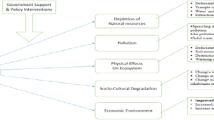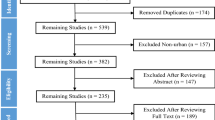Abstract
The two primary aims of the present study were: (1) to test the constructive pessimism hypothesis in relation to pro-environmental behavior, and (2) to clarify the relationship between pro-environmental behavior and anthropocentric values. Specifically, we focused on the idea that pessimistic anticipation of the future might facilitate actions aimed at avoiding an undesirable future, and that it may also be effective for reducing the pessimistic outlook about the future (i.e., ‘constructive pessimism’). Results of structural equation modeling using questionnaire survey data obtained in Tsukuba City, Japan (n = 300) confirmed that pessimistic anticipation of future subjective well-being facilitated pro-environmental behavior in the present. We also confirmed that both ecocentric and anthropocentric values facilitated pro-environmental behavior. Results suggest that psychological factors surrounding pro-environmental behavior, including constructive pessimism, should be taken into consideration in developing better policy interventions to facilitate such behavior.


Similar content being viewed by others
References
Abrahamse, W., & Steg, L. (2011). Factors related to household energy use and intention to reduce it: The role of psychological and socio-demographic variables. Research in Human Ecology, 18(1), 30–40.
Ajzen, I. (1985). From intentions to actions: A theory of planned behavior. In J. Kuhl & J. Beckmann (Eds.), Action control: From cognition to behavior (pp. 11–39). Heidelberg: Springer.
Ajzen, I. (1991). The theory of planned behavior. Organizational Behavior and Human Decision Processes, 50, 179–211.
Bamberg, S. (2013). Changing environmentally harmful behaviors: A stage model of self-regulated behavioral change. Journal of Environmental Psychology, 34, 151–159. doi:10.1016/j.jenvp.2013.01.002.
Barr, S. (2003). Strategies for sustainability: Citizens and responsible environmental behaviour. Area, 35(3), 227–240. doi:10.1111/1475-4762.00172.
Bentler, P. M., & Freeman, E. H. (1983). Tests for stability in linear structural equation systems. Psychometrika, 48(1), 143–145. doi:10.1007/BF02314682.
Bonaiuto, M., & Alves, S. (2012). Residential places and neighborhoods: Toward healthy life, social integration, and reputable residence. In S. D. Clayton (Ed.), The Oxford handbook of environmental and conservation psychology (pp. 221–247). New York: Oxford University Press.
Boulding, K. E. (1966). The economics of the coming spaceship earth. In H. Jarrett (Ed.), Environmental quality in a growing economy (pp. 3–14). Baltimore: Resources for the Future/Johns Hopkins University Press.
Brown, K. W., & Kasser, T. (2005). Are psychological and ecological well-being compatible? The role of values, mindfulness, and lifestyle. Social Indicators Research, 74(2), 349–368. doi:10.1007/s11205-004-8207-8.
Busseri, M. A., Choma, B. L., & Sadava, S. W. (2009). “As good as it gets” or “The best is yet to come”? How optimists and pessimists view their past, present, and anticipated future life satisfaction. Personality and Individual Differences, 47, 352–356. doi:10.1016/j.paid.2009.04.002.
Busseri, M. A., Malinowski, A., & Choma, B. L. (2013). Are optimists oriented uniquely toward the future? Investigating dispositional optimism from a temporally-expanded perspective. Journal of Research in Personality, 47, 533–538. doi:10.1016/j.jrp.2013.04.015.
Chan, L., & Bishop, B. (2013). A moral basis for recycling: Extending the theory of planned behaviour. Journal of Environmental Psychology, 36, 96–102. doi:10.1016/j.jenvp.2013.07.010.
Cornelissen, G., Pandelaere, M., Warlop, L., & Dewitte, S. (2008). Positive cueing: Promoting sustainable consumer behavior by cueing common environmental behaviors as environmental. International Journal of Research in Marketing, 25(1), 46–55. doi:10.1016/j.ijresmar.2007.06.002.
Corral Verdugo, V. (2012). The positive psychology of sustainability. Environment, Development and Sustainability, 14(5), 651–666. doi:10.1007/s10668-012-9346-8.
Corral-Verdugo, V., Mireles-Acosta, J., Tapia-Fonllem, C., & Fraijo-Sing, B. (2011). Happiness as correlate of sustainable behavior: A study of pro-ecological, frugal, equitable and altruistic actions that promote subjective wellbeing. Research in Human Ecology, 18(2), 95–104.
De Groot, J. I. M., & Steg, L. (2009). Mean or green: Which values can promote stable pro-environmental behavior? Conservation Letters, 2(2), 61–66. doi:10.1111/j.1755-263X.2009.00048.x.
De Young, R. (1986). Some psychological aspects of recycling: The structure of conservation satisfactions. Environment and Behavior, 18(4), 435–449.
De Young, R. (2000). Expanding and evaluating motives for environmentally responsible behavior. Journal of Social Issues, 56(3), 509–526.
Diener, E., Emmons, R. A., Larsen, R. J., & Griffin, S. (1985). The satisfaction with life scale. Journal of Personality Assessment, 49(1), 71–75.
Dietz, T., Fitzgerald, A., & Shwom, R. (2005). Environmental values. Annual Review of Environment and Resources, 30(1), 335–372. doi:10.1146/annurev.energy.30.050504.144444.
Dunlap, R. E., Van Liere, K. D., Mertig, A. G., & Jones, R. E. (2000). Measuring endorsement of the new ecological paradigm: A revised NEP scale. Journal of Social Issues, 56(3), 425–442.
Forgeard, M. J. C., & Seligman, M. E. P. (2012). Seeing the glass half full: A review of the causes and consequences of optimism. Pratiques Psychologiques, 18, 107–120. doi:10.1016/j.prps.2012.02.002.
Giorgetta, C., Grecucci, A., Zuanon, S., Perini, L., Balestrieri, M., Bonini, N., & Brambilla, P. (2012). Reduced risk-taking behavior as a trait feature of anxiety. Emotion, 12(6), 1373–1383. doi:10.1037/a0029119.
Gomez, V., Grob, A., & Orth, U. (2013). The adaptive power of the present: Perceptions of past, present, and future life satisfaction across the life span. Journal of Research in Personality, 47, 626–633. doi:10.1016/j.jrp.2013.06.001.
Hansla, A., Gamble, A., Juliusson, A., & Gärling, T. (2008). The relationships between awareness of consequences, environmental concern, and value orientations. Journal of Environmental Psychology, 28(1), 1–9. doi:10.1016/j.jenvp.2007.08.004.
Honold, J., Beyer, R., Lakes, T., & van der Meer, E. (2012). Multiple environmental burdens and neighborhood-related health of city residents. Journal of Environmental Psychology, 32(4), 305–317. doi:10.1016/j.jenvp.2012.05.002.
Hope, A. L. B., & Jones, C. R. (2014). The impact of religious faith on attitudes to environmental issues and Carbon Capture and Storage (CCS) technologies: A mixed methods study. Technology in Society, 38, 48–59. doi:10.1016/j.techsoc.2014.02.003.
IPCC. (2007). Climate change 2007: Synthesis report (p. 104). Geneva: IPCC.
Isaacowitz, D. M., & Seligman, M. E. (2001). Is pessimism a risk factor for depressive mood among community-dwelling older adults? Behaviour research and therapy, 39(3), 255–272. Retrieved from http://www.ncbi.nlm.nih.gov/pubmed/11227808
Jacob, J., Jovic, E., & Brinkerhoff, M. B. (2009). Personal and planetary well-being: Mindfulness meditation, pro-environmental behavior and personal quality of life in a survey from the social justice and ecological sustainability movement. Social Indicators Research, 93, 275–294. doi:10.1007/s11205-008-9308-6.
Kaida, N., & Kaida, K. (2015). Pro-environmental behavior correlates with present and future subjective well-being. Environment, Development and Sustainability. doi:10.1007/s10668-015-9629-y.
Kals, E., & Müller, M. M. (2012). Emotions and environment. In S. D. Clayton (Ed.), The Oxford handbook of environmental and conservation psychology (pp. 128–147). New York: Oxford University Press.
Kesebir, P., & Diener, E. (2008). In pursuit of happiness: Empirical answers to philosophical questions. Perspectives on Psychological Science, 3(2), 117–125. doi:10.1111/j.1745-6916.2008.00069.x.
Lee, Y.-J., & De Young, R. (1993). Intrinsic satisfaction derived from office recycling behavior: A case study in Taiwan. Social Indicators Research, 31, 63–76.
Lindenberg, S., & Steg, L. (2014). Goal-framing theory and norm-guided environmental behavior. In H. C. M. van Trijp (Ed.), Encouraging sustainable behavior: Psychology and the environment (pp. 37–54). New York: Psychology Press.
Maldonado, T. (1972). Design, nature, and revolution: Toward a critical ecology. New York: Harper & Row. Retrieved from http://books.google.co.jp/books/about/Design_nature_and_revolution.html?id=_MEiAAAAMAAJ&pgis=1
McKenzie-Mohr, D. (2000). Promoting sustainable behavior: An introduction to community-based social marketing. Journal of Social Issues, 56(3), 543–554. Retrieved from http://doi.wiley.com/10.1111/0022-4537.00183
Milfont, T. L., & Duckitt, J. (2010). The environmental attitudes inventory: A valid and reliable measure to assess the structure of environmental attitudes. Journal of Environmental Psychology, 30(1), 80–94. doi:10.1016/j.jenvp.2009.09.001.
Ministry of Internal Affairs and Communications. (2009). Family income and expenditure survey. Retrieved August 04, 2014, from http://www.e-stat.go.jp
Ministry of Internal Affairs and Communications. (2010). Population census. Retrieved August 04, 2014, from http://www.e-stat.go.jp
Ministry of Land Infrastructure Transport and Tourism of Japan. (2008). Living life general survey results (p. 182). Tokyo. Retrieved from http://www.mlit.go.jp/common/000132799.pdf
Moser, G. (2009). Quality of life and sustainability: Toward person–environment congruity. Journal of Environmental Psychology, 29(3), 351–357. doi:10.1016/j.jenvp.2009.02.002.
Nordlund, A. M., & Garvill, J. (2002). Value structures behind proenvironmental behavior. Environment and Behavior, 34(6), 740–756. doi:10.1177/001391602237244.
Nordlund, A. M., & Garvill, J. (2003). Effects of values, problem awareness, and personal norm on willingness to reduce personal car use. Journal of Environmental Psychology, 23(4), 339–347. doi:10.1016/S0272-4944(03)00037-9.
O’Brien, C. (2008). Sustainable happiness: How happiness studies can contribute to a more sustainable future. Canadian Psychology/Psychologie canadienne, 49(4), 289–295. doi:10.1037/a0013235.
Ojala, M. (2013). Coping with climate change among adolescents: Implications for subjective well-being and environmental engagement. Sustainability, 5(5), 2191–2209. doi:10.3390/su5052191.
Olli, E., Grendstad, G., & Wollebaek, D. (2001). Correlates of environmental behaviors: Bringing back social context. Environment and Behavior, 33(2), 181–208. doi:10.1177/0013916501332002.
Ortega Egea, J. M., & Garcia de Frutos, N. (2013). Toward consumption reduction: An environmentally motivated perspective. Psychology and Marketing, 30(8), 660–675. doi:10.1002/mar.
Oskamp, S., Harringson, M. J., Edwards, T. C., Sherwood, D. L., Okuda, S. M., & Swanson, D. C. (1991). Factors influencing household recycling behavior. Environment and Behavior, 23(4), 494–519.
Pavot, W., & Diener, E. (1993). Review of the satisfaction with life scale. Social Indicators Research, 39, 101–117. doi:10.1007/978-90-481-2354-4.
Scannell, L., & Gifford, R. (2010a). Defining place attachment: A tripartite organizing framework. Journal of Environmental Psychology, 30(1), 1–10. Retrieved from http://www.sciencedirect.com/science/article/pii/S0272494409000620
Scannell, L., & Gifford, R. (2010b). The relations between natural and civic place attachment and pro-environmental behavior. Journal of Environmental Psychology, 30(3), 289–297. doi:10.1016/j.jenvp.2010.01.010.
Schultz, P. W. (2001). The structure of environmental concern: Conern for self, other people, and the biosphere. Journal of Environmental Psychology, 21(4), 327–339. doi:10.1006/jevp.2001.0227.
Schultz, P. W., Gouveia, V. V., Cameron, Li, Tankha, D., Schmuck, P., & Franek, M. (2005). Values and their relationship to environmental concern and conservation behavior. Journal of Cross-Cultural Psychology, 36(4), 457–475. doi:10.1177/0022022105275962.
Schultz, P. W., Oskamp, S., & Mainieri, T. (1995). Who recycles and when? A review of personal and situational factors. Journal of Environmental Psychology, 15(2), 105–121. doi:10.1016/0272-4944(95)90019-5.
Schultz, P. W., & Zelezny, L. (1999). Values as predictors of environmental attitudes: Evidence for consistency across 14 countries. Journal of Environmental Psychology, 19, 255–265.
Schwartz, S. H. (1977). Normative influences on altruism. In L. Berkowitz (Ed.), Advances in experimental social psychology (Vol. 10, pp. 221–279). New York: Academic Press.
Seligman, M. E. P., Railton, P., Baumeister, R. F., & Sripada, C. (2013). Navigating into the future or driven by the past. Perspectives on Psychological Science, 8(2), 119–141. doi:10.1177/1745691612474317.
Snelgar, R. S. (2006). Egoistic, altruistic, and biospheric environmental concerns: Measurement and structure. Journal of Environmental Psychology, 26(2), 87–99. doi:10.1016/j.jenvp.2006.06.003.
Steg, L., & de Groot, J. I. M. (2012). Environmental values. In S. Clayton (Ed.), The Oxford handbook of environmental and conservation psychology (pp. 81–92). New York: Oxford University Press.
Steg, L., & Vlek, C. (2009). Encouraging pro-environmental behaviour: An integrative review and research agenda. Journal of Environmental Psychology, 29(3), 309–317. doi:10.1016/j.jenvp.2008.10.004.
Stern, P. C. (1999). Information, incentives, and proenvironmental consumer behavior. Journal of Consumer Policy, 22, 461–478.
Stern, P. C., Dietz, T., Abel, T., Guagnano, G. A., & Kalof, L. (1999). A value-belief-norm theory of support for social movements: The case of environmentalism. Research in Human Ecology, 6(2), 81–97.
Story, P. A., & Forsyth, D. R. (2008). Watershed conservation and preservation: Environmental engagement as helping behavior. Journal of Environmental Psychology, 28(4), 305–317. doi:10.1016/j.jenvp.2008.02.005.
Tabernero, C., & Hernandez, B. (2011). Self-efficacy and intrinsic motivation guiding environmental behavior. Environment and Behavior, 43(5), 658–675. doi:10.1177/0013916510379759.
Tapia-Fonllem, C., Corral-Verdugo, V., Fraijo-Sing, B., & Durón-Ramos, M. F. (2013). Assessing sustainable behavior and its correlates: A measure of pro-ecological, frugal, altruistic and equitable actions. Sustainability, 5(2), 711–723. doi:10.3390/su5020711.
Tartaglia, S. (2012). Different predictors of quality of life in urban environment. Social Indicators Research, 113(3), 1045–1053. doi:10.1007/s11205-012-0126-5.
Thøgersen, J. (2005). How may consumer policy empower consumers for sustainable lifestyles? Journal of Consumer Policy, 28(2), 143–177. doi:10.1007/s10603-005-2982-8.
Thøgersen, J. (2006). Norms for environmentally responsible behaviour: An extended taxonomy. Journal of Environmental Psychology, 26(4), 247–261. doi:10.1016/j.jenvp.2006.09.004.
Thompson, S. C. G., & Barton, M. A. (1994). Ecocentric and anthropocentric attitudes toward the environment. Journal of Environmental Psychology, 14, 149–157.
UN General Assembly. (2012). The Future we want (Resolution adopted by the General Assembly on 27 July 2012). The United Nations (p. 53). New York: UN General Assembly.
UNEP. (2012a). Global outlook on sustainable consumption and production policies: Taking action together. UNEP (p. 220). Nairobi: UNEP.
UNEP. (2012b). 21 Issues for the 21st century: Results of the UNEP foresight process on emerging environmental issues (p. 56). Nairobi: UNEP.
Venhoeven, L. A., Bolderdijk, J. W., & Steg, L. (2013). Explaining the paradox: How pro-environmental behaviour can both thwart and foster well-being. Sustainability, 5, 1372–1386. doi:10.3390/su5041372.
Wakefield, S. E. L., Elliott, S. J., Eyles, J. D., & Cole, D. C. (2006). Taking environmental action: The role of local composition, context, and collective. Environmental Management, 37(1), 40–53. doi:10.1007/s00267-004-0323-3.
Wallach, M. A., & Wallach, L. (1983). Psychology’s sanction for selfishness: The error of egoism in theory and therapy. San Francisco: W.H. Freeman and Company.
Zelenski, J. M., & Nisbet, E. K. (2012). Happiness and feeling connected: The distinct role of nature relatedness. Environment and Behavior, 46(1), 3–23. doi:10.1177/0013916512451901.
Author information
Authors and Affiliations
Corresponding author
Rights and permissions
About this article
Cite this article
Kaida, N., Kaida, K. Facilitating Pro-environmental Behavior: The Role of Pessimism and Anthropocentric Environmental Values. Soc Indic Res 126, 1243–1260 (2016). https://doi.org/10.1007/s11205-015-0943-4
Accepted:
Published:
Issue Date:
DOI: https://doi.org/10.1007/s11205-015-0943-4




